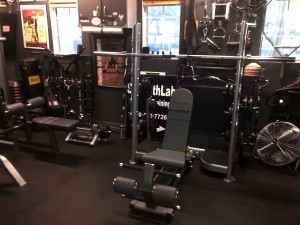Strengthlab on Aug 23rd 2015 StrengthLab Thoughts
This is a professional book that any health and fitness “expert” should know and study slowly; every time there’s a new edition, I buy it, and I read it carefully – ALL 900 pages!
ACSM’s Resource Manual for Guidelines for Exercise Testing and Prescription was created as a complement to ACSM’s Guidelines for Exercise Testing and Prescription and elaborates on all major aspects of preventative rehabilitation and fitness programs and the major position stands of the ACSM. The 7th edition provides information necessary to address the knowledge, skills, and abilities set forth in the new edition of Guidelines, and explains the science behind the exercise testing and prescription. ACSM’s Resource Manual is a comprehensive resource for those working in the fitness and clinical exercise fields, as well as those in academic training.
http://www.amazon.com/Resource-Guidelines-Exercise-Prescription-Guidlies/dp/1609139569/ref=sr_1_sc_1?ie=UTF8&qid=1408934347&sr=8-1-spell&keywords=acsm+and+resource+manual+and+guideline
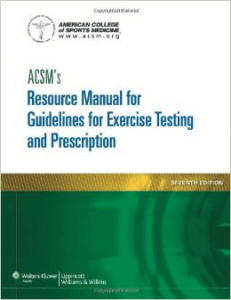
Strengthlab on Aug 23rd 2015 StrengthLab Thoughts
Winner of the Pulitzer prize in 1974 and the culmination of a life’s work, The Denial of Death is Ernest Becker’s brilliant and impassioned answer to the “why” of human existence. In bold contrast to the predominant Freudian school of thought, Becker tackles the problem of the vital lie — man’s refusal to acknowledge his own mortality. In doing so, he sheds new light on the nature of humanity and issues a call to life and its living that still resonates more than twenty years after its writing.
http://www.amazon.com/Denial-Death-Ernest-Becker/dp/0684832402/ref=sr_1_1?ie=UTF8&qid=1440346144&sr=8-1&keywords=denial+of+death
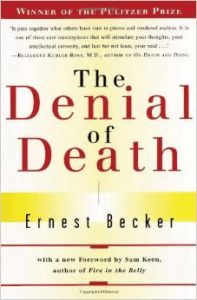
Strengthlab on Aug 23rd 2015 StrengthLab Thoughts
Being young is frequently filled with a bunch of wasted time and very little thought for others; with concerted effort, being older can be filled with “thoughtful” thoughts, knowledge and new skills, time better spent, not wasted, closer friends and more concern for others and things that matter. Decline and decay? Nop, perhaps just better!
Strengthlab on Aug 23rd 2015 StrengthLab Thoughts
Improvement is a slow and steady race in most cases, making a skill or behavior permanent, especially under stress, takes time and practice. Eventually our neurons wire together and fire together without our conscious thought, at this point we have learned a new skill or mastered a new behavior.
Slow to pick new things up? No problem. The “tortoise” tends to retain what they’ve learned long-term better and frequently to even know it better than the “hare” (sometimes the hare moves on too quickly or doesn’t learn it well enough to make it permanent).
Strengthlab on Aug 23rd 2015 StrengthLab Thoughts
Most aspects of our personality (thoughts and behavior) are modifiable; we can get worse or we can get better at something. Why not improve? If we have a personality trait or characteristic that is too weak, or too strong, we can improve it, or we can ignore it, allowing it to stay the same or even get worse. When things don’t improve that need improving, or even get worse, we suffer and so do those around us. If we tend to get angry too quick, or fail to listen well when someone else is speaking, we can certainly improve it. Don’t know enough about something, we can learn more about it and apply it. We are not a “fixed” and “permanent” personality, we are constantly changing, why not work to make these changes positive and constructive rather than negative and destructive?
Progress through personal improvement is certainly worth our time; and others will benefit as well!
Strengthlab on Aug 16th 2015 StrengthLab Thoughts
We enjoyed family camping, trails and great temperatures in Flagstaff this last weekend.
Hiking Fat Man’s Loop (pictured below) is a quick and easy trail for the uninitiated.
Afterwards we hit the local Farmer’s Market.


Strengthlab on Aug 16th 2015 StrengthLab Thoughts
An astonishing new science called “neuroplasticity” is overthrowing the centuries-old notion that the human brain is immutable. In this revolutionary look at the brain, psychiatrist and psychoanalyst Norman Doidge, M.D., provides an introduction to both the brilliant scientists championing neuroplasticity and the people whose lives they’ve transformed. From stroke patients learning to speak again to the remarkable case of a woman born with half a brain that rewired itself to work as a whole, The Brain That Changes Itself will permanently alter the way we look at our brains, human nature, and human potential.
http://www.amazon.com/The-Brain-That-Changes-Itself/dp/0143113100
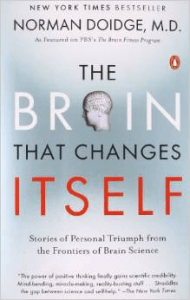
Strengthlab on Aug 9th 2015 StrengthLab Thoughts
Exercise intensity should vary throughout the week. There’s an inverse relationship between intensity and duration (e.g., increase your intensity and the duration of activity will decrease; decrease your intensity and the duration of activity will increase). Hitting every workout with high intensity is a common mistake among men, while hitting every workout with lower intensity is a common mistake among women. Vary your duration of physical activity, as well as your intensity level throughout the week and you’re more likely to adhere to your exercise program and achieve better results.
Strengthlab on Aug 9th 2015 StrengthLab Thoughts
Is your blood sugar elevated, but not yet high enough to be considered Type 2 Diabetes?
This is a common condition and quite reversible; appropriate exercise and food selection will role this condition back to normal levels.
Need a client reference who has had this condition and together we cured it? No problem, just ask.
Strengthlab on Aug 9th 2015 StrengthLab Thoughts
The University of Penn and Professor Martin Seligman are considered pioneers in Positive Psychology and Happiness research. The following is a link to their extensive Questionnaire Center where you can take self-exams and learn more about your current disposition and aptitudes with suggestions on how and where to improve.
https://www.authentichappiness.sas.upenn.edu/testcenter

Strengthlab on Aug 7th 2015 StrengthLab Thoughts
The Practical Neuroscience of Happiness, Love, and Wisdom; If you change your brain, you can change your life.
Amazon Book Review:
Great teachers like the Buddha, Jesus, Moses, Mohammed, and Gandhi were all born with brains built essentially like anyone else’s—and then they changed their brains in ways that changed the world. Science is now revealing how the flow of thoughts actually sculpts the brain, and more and more, we are learning that it’s possible to strengthen positive brain states.
By combining breakthroughs in neuroscience with insights from thousands of years of mindfulness practice, you too can use your mind to shape your brain for greater happiness, love, and wisdom. Buddha’s Brain draws on the latest research to show how to stimulate your brain for more fulfilling relationships, a deeper spiritual life, and a greater sense of inner confidence and worth. Using guided meditations and mindfulness exercises, you’ll learn how to activate the brain states of calm, joy, and compassion instead of worry, sorrow, and anger. Most importantly, you will foster positive psychological growth that will literally change the way you live in your day-to-day life.
This book presents an unprecedented intersection of psychology, neurology, and contemplative practice, and is filled with practical tools and skills that you can use every day to tap the unused potential of your brain and rewire it over time for greater well-being and peace of mind.
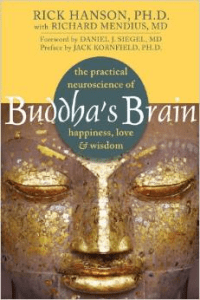
Strengthlab on Aug 6th 2015 StrengthLab Thoughts
We function best on quality food (e.g. vegetables and fruits, whole grains and lean proteins) the way nature intended them; avoid all artificial ingredients such as flavors, colors, additives, perservatives and sugar substitutes. They have no redeeming health qualities and are easily avoided with conscious effort.
These are examples to avoid found on many product’s ingredients list:
- acetylated esters of mono- and diglycerides
- acesulfame-K (acesulfame potassium)
- ammonium chloride
- artificial colors
- artificial flavors
- aspartame
- azodicarbonamide
- benzoates in food
- benzoyl peroxide
- BHA (butylated hydroxyanisole)
- BHT (butylated hydroxytoluene)
- bleached flour
- bromated flour
- brominated vegetable oil (BVO)
- calcium bromate
- calcium disodium EDTA
- calcium peroxide
- calcium propionate
- calcium saccharin
- calcium sorbate
- calcium stearoyl-2-lactylate
- caprocaprylobehenin
- carmine
- certified colors
- cyclamates
- cysteine (l-cysteine), as an additive for bread products
- DATEM (Diacetyl tartaric and fatty acid esters of mono and diglycerides)
- dimethylpolysiloxane
- dioctyl sodium sulfosuccinate (DSS)
- disodium calcium EDTA
- disodium dihydrogen EDTA
- disodium guanylate
- disodium inosinate
- EDTA
- ethyl vanillin
- ethylene oxide
- ethoxyquin
- FD & C colors
- GMP (disodium guanylate)
- hexa-, hepta- and octa-esters of sucrose
- high fructose corn syrup
- hydrogenated fats
- IMP (disodium inosinate)
- irradiated foods
- lactylated esters of mono- and diglycerides
- lead soldered cans
- methyl silicon
- methylparaben
- microparticularized whey protein derived fat substitute
- monosodium glutamate (MSG)
- natamycin
- nitrates/nitrites
- partially hydrogenated oil
- polydextrose
- potassium benzoate
- potassium bisulfite
- potassium bromate
- potassium metabisulfite
- potassium sorbate
- propionates
- propyl gallate
- propylparaben
- saccharin
- sodium aluminum sulfate
- sodium benzoate
- sodium bisulfite
- sodium diacetate
- sodium glutamate
- sodium nitrate/nitrite
- sodium propionate
- sodium stearoyl-2-lactylate
- sodium sulfite
- solvent extracted oils, as standalone single-ingredient oils (except grapeseed oil).
- sorbic acid
- sucralose
- sucroglycerides
- sucrose polyester
- sulfites (sulfur dioxide)
- TBHQ (tertiary butylhydroquinone)
- tetrasodium EDTA
- vanillin
Strengthlab on Aug 6th 2015 StrengthLab Thoughts
We have way too much faith in pills, supplements and shortcuts and way too little trust in eating fruits, vegetables, exercising adequately and resting appropriately. Rarely is popping a pill or taking a perceived shortcut the best solution. In addition, work to improve your relationships; our greatest joys and our best health are found and shared through others.
Strengthlab on Aug 6th 2015 StrengthLab Thoughts
What Scientists Have Learned and How You Can Use It!
Scientists and academics have spent entire careers investigating what makes people happy. But hidden in obscure scholarly journals and reports, their research is all too often inaccessible to ordinary people. Now the bestselling author of the 100 Simple Secrets series distills the scientific findings of over a thousand of the most important studies on happiness into easy-to-digest nuggets of advice. Each of the hundred practices is illustrated with a clear example and illuminated by a straightforward explanation of the science behind it to show you how to transform a ho-hum existence into a full and happy life.
- Believe in yourself: Across all ages, and all groups, a solid belief in one’s own abilities increases life satisfaction by about 40 percent, and makes us happier both in our home lives and in our work lives.
- Turn off your TV: Watching too much TV can triple our hunger for more possessions, while reducing our personal contentment by about 5 percent for every hour a day we watch.
Strengthlab on Aug 6th 2015 StrengthLab Thoughts
This type of research and evidence continues to gain traction. Train smart after 40!
Are endurance athletes hurting their hearts by repeatedly pushing beyond what is normal?
http://velonews.competitor.com/cycling-extremes





